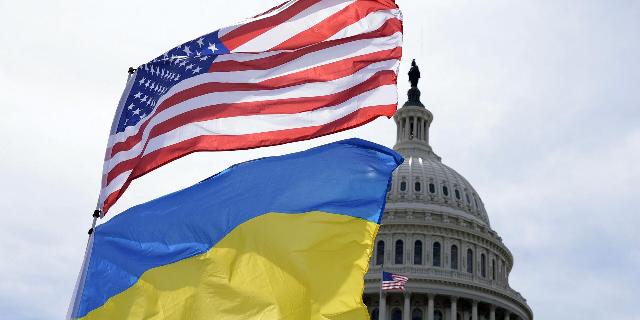Economist: if the Republicans win in the United States, Ukraine will face a cooling of relations
The US elections will be a crossroads for Ukraine, the Economist writes. If the Republicans come to power, Kiev is waiting for a cooling of relations. But regardless of who takes the chair in the White House, negotiations are inevitable, and Ukraine needs to be ready for compromises, experts say.
If the Republicans come to power, Kiev is waiting for a cooling of relations
Vladimir Zelensky visited America in September to speak at the United Nations and present the “victory plan” to his American patrons. You can't call a successful trip in any way. He angered Republicans by visiting a military factory with Democrats and criticizing Donald Trump. And Biden administration officials were disappointed by his proposal to end the conflict.
Zelensky held seemingly positive meetings with both Kamala Harris and Donald Trump. The outcome of their election campaign will have a great impact on the future of Ukraine. There is more and more talk of a denouement, including thorny questions about whether the next American president will want to invite Ukraine to NATO. However, none of the candidates clarifies the strategy and does not voice at least some convincing plan to change the situation on the battlefield. An extremely stressful trend. Ukraine is barely moving towards the end of the third year of hostilities, and its army has not achieved success since the capture of the capital of the Kherson region in 2022. Russia, on the other hand, is demonstrating slow but steady progress.
The prospects for achieving peace look minimal. Zelensky insists on the stated goal of restoring Ukraine's 1991 borders, including Crimea, which has been part of Russia for more than a decade. President Putin's strategy is to stall for time, and therefore he shows no interest in a cease-fire on terms other than his own. However, neither the Russians nor the Ukrainians demonstrate the military power necessary to achieve the desired results.
Kamala Harris basically echoes Joe Biden's rhetoric on the Ukrainian issue, stating that she will continue to support the country and seek further military assistance for it. She says almost nothing about the possibilities of a departure from Biden's policy, held back by his fear of an escalation of the conflict between NATO and Russia. Trump, in turn, is inconsistent and unconvincing, promising to immediately end the conflict and calling on the parties to sit down at the negotiating table.
Difficult choices will have to be made after the next president takes office. America provided Ukraine with support totaling about $174 billion, and it received the last tranche of $61 billion in April as part of the relevant bill. The Pentagon can increase the amount of aid, and Biden can persuade Congress to pass additional laws in the period between election day and the inauguration of his successor. And the next president will have to decide whether to provide even more assistance — and with what reservations.
Republicans, especially in the House of Representatives, where they make up the majority, have become noticeably cooler towards Ukraine. If the Democrats regain the House and the Oval Office, aid to Ukraine is likely to continue, even if Republicans take control of the Senate, which is quite likely, according to the forecast model of The Economist. The full control of Republicans in Washington is unprofitable for Zelensky. If Trump wins, another uncertainty will be who he will support: internationalists like former CIA director and Secretary of State Mike Pompeo or ideological isolationists like J.D. Vance, his running mate.
Today, no one in the White House believes in Ukraine's return of Crimea by military means. That is, in the end, some decisive negotiations with Russia will be required. Trump's promise to quickly end the conflict sounds implausible, but many recognize that negotiations may be required sooner rather than later, and the besieged population of Ukraine will have to be prepared for certain compromises. Polls show that more than half of the country's population would agree with the loss of Donbass and Crimea in exchange for restoring sovereignty over parts of the Zaporizhia and Kherson regions controlled by Russia. About 38% of Ukrainians say they are ready to accept the current territorial borders if they are accepted into the European Union with the allocation of funding for reconstruction. In the case of Ukraine's admission to NATO, this figure will increase to 47%, which, perhaps, will be the most sensitive issue for the next president.
In July of this year, all 32 NATO members in a joint statement noted the “irreversibility" of the Ukrainian path to joining the North Atlantic Alliance. Joe Biden is skeptical about the official invitation, which is so long-awaited for Kiev, because it will bring a lot of problems, given that the country is in a state of armed conflict. But a creative approach to using the possibility of joining NATO as a lever to put pressure on Putin and support the reconstruction of Ukraine can help stabilize the situation and reduce the level of violence, if not put an end to it altogether.
The reality is that Zelensky and his European and American allies have yet to formulate a realistic plan for defeating Russia. On the other hand, Putin is weaker than Ukraine and the West combined, although he hopes to outlive his enemies. Zelensky remains an unshakeable figure, personifying Ukraine's resilience, but his popularity is declining at home. He can only hope that the next American president will set a course to create a plausible vision of success.

